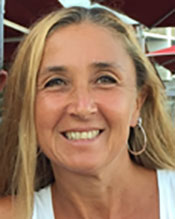 Prof. Gloria Menegaz is a professor of bioengineering in the Department of Computer Science, University of Verona, Italy where she leads the Neuroimaging Lab. She serves as an associate editor of IEEE Signal Processing Letters and EURASIP Journal on Image and Video Processing, and she was a guest editor of Journal of Display Technology. She was chair of three editions of the IEEE Signal Processing Society (SPS) Winter School on Brain Connectomics (2016, 2017, and 2019) and SPS Winter School on Imaging Genetics (2019) and a member of the Organizing Committee of the IEEE International Symposium on Biomedical Imaging (2019 and 2022). She is a Senior Member of IEEE, a member of the SPS Technical Committee on Bio Imaging and Signal Processing, SPS Representative to the Transactions on Medical Imaging Steering Committee (2021-2023) and a member of IEEE Woman in Engineering. Her research interests are mainly in the field of neuroimaging, brain connectivity, imaging genetics and the exploitation of explainable AI methods for answering the inherent research questions.
Prof. Gloria Menegaz is a professor of bioengineering in the Department of Computer Science, University of Verona, Italy where she leads the Neuroimaging Lab. She serves as an associate editor of IEEE Signal Processing Letters and EURASIP Journal on Image and Video Processing, and she was a guest editor of Journal of Display Technology. She was chair of three editions of the IEEE Signal Processing Society (SPS) Winter School on Brain Connectomics (2016, 2017, and 2019) and SPS Winter School on Imaging Genetics (2019) and a member of the Organizing Committee of the IEEE International Symposium on Biomedical Imaging (2019 and 2022). She is a Senior Member of IEEE, a member of the SPS Technical Committee on Bio Imaging and Signal Processing, SPS Representative to the Transactions on Medical Imaging Steering Committee (2021-2023) and a member of IEEE Woman in Engineering. Her research interests are mainly in the field of neuroimaging, brain connectivity, imaging genetics and the exploitation of explainable AI methods for answering the inherent research questions.
We approached Prof. Gloria Menegaz with a few questions to learn more:
1. What was the most important factor in your success?
I believe the most important factors are perseverance, commitment and motivation. Of course, you have to love science and be aware that pursuing such a career will pose many challenges, that the competition is hard, and the more you grow the more the path becomes steep, so you have to keep focussed on your objectives and never give up!
Then, you need a favorable environment, meaning support from both the personal and the professional levels. From the personal side, the family plays a fundamental role in shaping a strong character featuring the right level of self-confidence and attitude to risk, and helping you to recover from falls. From the professional side, having a mentor that guides you especially in the first steps of your career is important, though not having one should not discourage from keeping the target and doing your best to pursue it.
Last but not least, I believe that human factors also play a prominent role. Being ready to listen, ready to help, having a positive attitude that is “always being part of the solution”, and not “part of the problem”, as my mentor Prof. Murat Kunt was saying, when facing difficulties is as important as well, end provides evidence of resilience and endurance, besides triggering a positive feedback on your students and collaborators. Being able to give a "good example" is in my opinion one of the foremost important measures of your success.
2. Failures are an inevitable part of everyone’s career journey, what is the most important lesson you learned during your career when dealing with failures?
To never give up! Failures are parts of the game. Being a researcher means to take challenges that are difficult and you must be aware that there is no guarantee of success. Whatever the outcome, what is important is what you learn along the path, and to learn from your own mistakes. One thing that I would suggest to young researcher is to dive deep into the issues without yielding to the temptation of giving up and turning to another. In my experience, failures help in understanding what is wrong in our approach, and thus to dive deeply into the problem, or to change perspective, to get over it and get closer and closer to the solution. Once again, failures teach resilience, while success feeds self confidence.
3. Please share your work of societal impact with us.
The societal impact of my work is due to the translational character of my research. My main field of research is neuroimaging and imaging genetics, that is a branch of biomedical signal and image processing focusing on brain structure and function as well as on the investigation of the interplay between genetic determinants and image-derive endophenotypes. Basically, we analyze and model signals that represent either the microstructure of brain tissues or the neurophysiological signals that are measured in different conditions, that is either in resting state or while performing specific tasks, and investigate the link with the genetic information, when it is available. Such models can be exploited in wide spectrum of fields and applications, ranging from basic neurosciences, where the target is to investigate brain structure and function per-se, to the clinical field, where they support diverse applications, from early diagnosis of neurodegenerative diseases, while enabling the identification of new numerical disease biomarkers, to surgical planning. This clearly points to precision medicine, which has the ambitious aim of subject-specific care and treatment. Of course, the substrate of this research, besides signal processing, is explainable artificial intelligence, that allows modeling complex non-linear relationships among multi-modal data with unprecedented effectiveness and performance. In summary, the societal impact regards the neuroscience and clinical field, targeting improved healthcare technologies and precision medicine.
4. During these COVID times, the teaching and learning has become online for some time as of now. What do you think are some of the challenges being faced in carrying out quality teaching as well as quality research? Do you have any suggestions for students and faculty?
In these last two years we have been experiencing a shift of paradigm affecting our lives in all respects. From the professional point of view, as it also the case for the personal, the lack of face-to-face relationships has impoverished our environment, that is devoid of non-verbal communication mechanisms that are essential for the human beings. Concerning teaching, I think this has triggered a change that was already on the way, as a natural consequence of the many technological means that have become available in the last years. To be honest, I have shared feelings in this respect. On the one haND, I admit it is frustrating to teach in front of a screen instead of a class, not being able to establish any personal relationship with the students and thus to convey non-verbal messages, going beyond the content of the course, such as enthusiasm and passion. On the other hand, I think that enabling the streaming during the lessons and making them available online is of great help for many students. I think of students that are in deprived areas, or that are also workers, or that simply leave far from the University. Also, all students can listen to the lessons as many time as they need, potentially reducing the level of stress. Given that, it is our role to encourage and motivate the students to go to the class anyways, and to make them understand that that kind of communication is limited, and that enjoying learning and doing research with colleagues and teachers in-person would be a so enriching experience at both professional and personal levels that it would worth the effort.
We are facing a very difficult objective, and I am not sure we are ready to face it in the appropriate way. Of corse we can rely on many tools to improve the quality of online teaching, yet the optimal solution is still to be found. However, this is a transition that we have to manage, because I am convinced that this paradigm shift will last even after the end of the pandemics. We will have to learn from our mistakes and join our efforts while relying on the students’ feedback. We have to work as a team, professors, students and more in general the scientific community.
Regarding research, this is not a one-man thing. Brainstorming is essential for boosting out-of-the-box thinking, and in-person discussion can count also on non-verbal communication, which triggers thoughts and ideas that are emotionally driven and that would not be elicited by online discussions. Nevertheless, I can say that with my group we could bridge the geographical gap by intensifying the periodic meetings and discussing for hours on zoom and any possible technological means. However, if this could work for solid pre-existing relationships, it becomes less effective for newcomers and for doing networking, where new relationships need to be established. I do hope that we will recover the in-person dimension at least as a complement to online meetings.
Thank you very much for this opportunity to express my thoughts and share them with the IEEE and SPS community, and beyond.
To learn more about Prof. Gloria Menegaz, please visit her webpage.

 Prof. Gloria Menegaz is a professor of bioengineering in the Department of Computer Science, University of Verona, Italy where she leads the Neuroimaging Lab. She serves as an associate editor of IEEE Signal Processing Letters and EURASIP Journal on Image and Video Processing, and she was a guest editor of Journal of Display Technology. She was chair of three editions of the IEEE Signal Processing Society (SPS) Winter School on Brain Connectomics (2016, 2017, and 2019) and SPS Winter School on Imaging Genetics (2019) and a member of the Organizing Committee of the IEEE International Symposium on Biomedical Imaging (2019 and 2022). She is a Senior Member of IEEE, a member of the SPS Technical Committee on Bio Imaging and Signal Processing, SPS Representative to the Transactions on Medical Imaging Steering Committee (2021-2023) and a member of IEEE Woman in Engineering. Her research interests are mainly in the field of neuroimaging, brain connectivity, imaging genetics and the exploitation of explainable AI methods for answering the inherent research questions.
Prof. Gloria Menegaz is a professor of bioengineering in the Department of Computer Science, University of Verona, Italy where she leads the Neuroimaging Lab. She serves as an associate editor of IEEE Signal Processing Letters and EURASIP Journal on Image and Video Processing, and she was a guest editor of Journal of Display Technology. She was chair of three editions of the IEEE Signal Processing Society (SPS) Winter School on Brain Connectomics (2016, 2017, and 2019) and SPS Winter School on Imaging Genetics (2019) and a member of the Organizing Committee of the IEEE International Symposium on Biomedical Imaging (2019 and 2022). She is a Senior Member of IEEE, a member of the SPS Technical Committee on Bio Imaging and Signal Processing, SPS Representative to the Transactions on Medical Imaging Steering Committee (2021-2023) and a member of IEEE Woman in Engineering. Her research interests are mainly in the field of neuroimaging, brain connectivity, imaging genetics and the exploitation of explainable AI methods for answering the inherent research questions.
